Riley Adams's Blog, page 177
May 15, 2012
The Who, What, and Where of Characters and Story--By Sandra Gardner
by Sandra Gardner
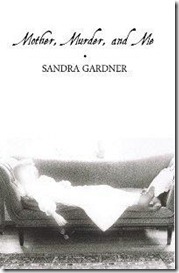 Since character and story are major elements in a novel, your primary concern as a novelist is to figure out who your characters are, what their motivations are, and where your characters – and your story – want to go. Exactly how they get there can be dealt with later.
Since character and story are major elements in a novel, your primary concern as a novelist is to figure out who your characters are, what their motivations are, and where your characters – and your story – want to go. Exactly how they get there can be dealt with later.
For me, it began with a vision of my mother standing over me while I was sick, lying on the couch. Without worrying about whether I was hallucinating, I dragged myself to my computer and ended up with 20 or so pages. So far, I had a mother, about age 70, in a contentious relationship with a daughter, who was in her late 30s. The only other thing that was clear to me was that the mother was dead, a fact that did nothing to alleviate their contentious relationship.
Okay, now what? I didn’t think a mother/daughter relationship alone, even a conflicted one, was enough to carry a whole novel. As soon as my head cleared, I typed 20 more pages, this time adding the murder of the daughter’s longtime psychotherapist.
Now I had an M.C. (main character), a ghost, and a murder. A ghost, by the way, with loud opinions on just about everything, especially her daughter’s actions. I could see the potential for humor in the narrator/protagonist’s view of things. This has been borne out by readers’ responses.
But what was the reason for the ghost-mother to come back? Continuing to annoy her daughter wasn’t enough motivation. Aha! The mother knew that her daughter was about to get into big trouble, so she came back to help. She also imagined herself as the next Jessica Fletcher, from “Murder She Wrote.”
The trouble she came back to was the murder (of course). This involved her daughter, the M.C., in several ways. She soon became the prime suspect of the detective on the case. Why? Because one of the members of the therapy group – or someone else connected with the therapist – framed our M.C.
The involvement of the therapy group, plus several other people, produced a cast of not-very-nice suspicious characters and red herrings. Then our M.C’s. – and her ghost-mother’s -- sleuthing to find the killer and the person framing her, got her almost killed.
Meanwhile, our M.C. had to go work every day, deal with her tyrannical, incompetent boss, find her way into a relationship with a new boyfriend, and occasionally do lunch or aerobics with her best friend.
To up the ante, I added another murder -- this time, a member of the therapy group. Our unfortunate M.C.landed herself in the wrong place at the wrong time. She ended up charged with both murders and thrown in jail.
Now we have two murders, one attempted murder, and our M.C. locked up. How was she going to solve the murders and clear herself, when she was in jail? Besides her mother-the-ghost-detective, she enlisted the help of her best friend and a member of the therapy group.
To keep upping the ante, I put our M.C. in even more dire straits. There was a second attempt on her life, while she was in jail. After a few more red herrings, the killer finally revealed him or herself, with a third attempt on our M.C.’s life.
What happened next? Well, to find out whodunit, you’ll have to read the book: my newly published mystery, MOTHER, MURDER AND ME. After all, it is a mystery novel! Hopefully, this little article will help you deal with the who, what and where of characters and story, when you start thinking of your first – or next – murder mystery.
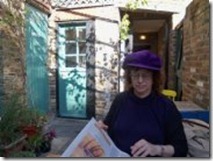 Sandra Gardner’s mystery novel, MOTHER, MURDER AND ME, was a winner of Sawyers Publishing’s First New Author (fiction) Contest 2011. It was published by Sawyers in spring 2012, and is available on Amazon.com; Barnes & Noble.com; Smashwords.com; and from the publisher. Sandra may be contacted via email: sgardner2@hvc.rr.com; or on her Facebook page: Sandra Gardner (sandywritesbooks@gmail.com).
Sandra Gardner’s mystery novel, MOTHER, MURDER AND ME, was a winner of Sawyers Publishing’s First New Author (fiction) Contest 2011. It was published by Sawyers in spring 2012, and is available on Amazon.com; Barnes & Noble.com; Smashwords.com; and from the publisher. Sandra may be contacted via email: sgardner2@hvc.rr.com; or on her Facebook page: Sandra Gardner (sandywritesbooks@gmail.com).
May 13, 2012
A Random Act of Kindness Blitz
The online writing community is very tight-knit and supportive....probably because the writing life can be so isolating. Most of us have someone in this community who we find especially inspiring and helpful.
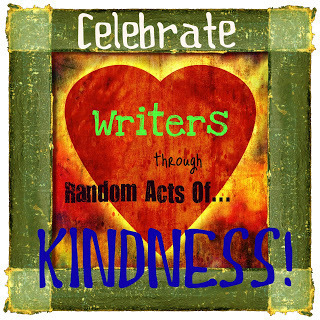
To commemorate the release of their book The Emotion Thesaurus, Becca and Angela at The Bookshelf Muse are hosting a Random Act Of Kindness BLITZ.
There are many writing friends who are supportive on a daily basis--I couldn't name them all here or the blog might crash. Some writers always comment on my blog (and I read and appreciate every comment I get), some are always there for me on Twitter, RTing the links I share. There are some writers who read my blog on Facebook on Networked Blogs and like my posts there. Some writers are folks I know in person--they give me career advice (which is incredibly appreciated, since it can be hard to know what direction to go in as a writer.)
Then there are writers who provide me with inspiration and writing advice. I subscribe to some incredible blogs--a few of those blogs that I could even set up Twitter to automatically tweet everything they post...because their posts are always good.
So today, I'd like to recognize one of those writers--K.M. Weiland. Her posts are top-notch resources for writers who are interested in improving their work. I tweet every post
 because the information there is invaluable for writers. Her main blog is Wordplay and she also posts on a rotation at the AuthorCulture blog. She writes fiction, short stories, and nonfiction--her books can be found here. You can find her on Facebook, Twitter, and Pinterest.
because the information there is invaluable for writers. Her main blog is Wordplay and she also posts on a rotation at the AuthorCulture blog. She writes fiction, short stories, and nonfiction--her books can be found here. You can find her on Facebook, Twitter, and Pinterest.Katie has just finished a ten-part series on story structure that covered everything from the inciting incident (place the inciting incident in the first 25% of the book and pull the protagonist into that incident) to the midpoint ("it must act as a personal catalyst upon the main character") to the resolution ("the resolution should give the reader a concrete example of how the character's journey has changed him.")
And this was just used as an example. Go to K.M. Weiland's blog to find posts on backstory, dialogue, pacing, and more.
As a thank you for her resource for writers at Wordplay and to follow the rules of the Random Act of Kindness Blitz, I'm sending her a bookstore gift certificate so she can spend a little time relaxing with a book.
Becca and Angela designed this blitz to encourage us to recognize other writers--they urge us to "send them an email, give them a shout out, or show your appreciation in another way. "
Becca and Angela have a special RAOK gift waiting for my blog readers as well, so hop on over to The Bookshelf Muse to pick it up.
Who has helped you on your journey to publication or provided helpful resources or encouragement for you? Have you discovered K.M. Weiland's blog? Which blogs do you find especially helpful for writers?
May 12, 2012
Twitterific
by Elizabeth S. Craig, @elizabethscraig
Twitterific is a compilation of all the writing links I shared the previous week.
the previous week.
The links are fed into the Writer’s Knowledge Base search engine (developed by writer and software engineer Mike Fleming) which has over 15,000 free articles on writing-related topics. Sign up for our free newsletter for monthly writing tips and interviews with top contributors to the WKB or like us on Facebook.
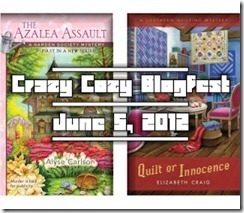 Don't' forget the new release blogfest that Hart Johnson and I are hosting on June 5th—find more information and sign up here. The best entries get signed copies of our new releases.
Don't' forget the new release blogfest that Hart Johnson and I are hosting on June 5th—find more information and sign up here. The best entries get signed copies of our new releases.
Have a great week! And Happy Mother's Day to my mother and all mothers, today. :)
Publishers--the window is closing: http://bit.ly/JPRUjD @harkaway @Porter_Anderson @conville_walsh
You Are Not Your Bookshelf: http://bit.ly/INOuSL @readingape
How to finish writing a novel: http://bit.ly/INOXV2 @ava_jae
The ebook marketplace is a long way from settled: http://bit.ly/ISnN9f @MikeShatzkin
Strategies For Writing About Loss: http://bit.ly/INQwCt @BTMargins
Whose Story Is It? http://bit.ly/J7liEq @mooderino
3 Core Elements of Storytelling (And Why You Should Write Them Right Away): http://bit.ly/J7lrHN
10 synonyms for tacky: http://bit.ly/J7lB1Y @writing_tips
Psychology in Worldbuilding: http://bit.ly/J7lIKO @juliettewade
Harlequin Fail: http://bit.ly/IB8F1N @PassiveVoiceBlg @annvosspeterson
Traditional Publishing And Self-Publishing Are Not Mutually Exclusive: http://bit.ly/J7lKT0 @thecreativepenn
13 Reasons the Police Might Oppose a Superhero: http://bit.ly/J7muaQ
Do Deadlines Hurt Us or Help Us? http://bit.ly/J7mDuR @jodyhedlund
Why It's So Hard to Become a Writer (and 5 Tips to Break Through): http://bit.ly/J7mSGj @krissybrady
5 tips for a successful book event: http://bit.ly/JdqZye @curiosityquills
A look at in-laws in crime fiction: http://bit.ly/JhjhUK @mkinberg
Story Structure: The Third Act: http://bit.ly/Jdr7xD @KMWeiland
Writing and receiving book reviews: http://bit.ly/INKqC3 @beth_barany
Reviewing Your Reviews: How to Absorb Feedback from Writing Contests: http://bit.ly/INOMt1 @jeanniecampbell
5 Things 1 Writer Learned About Self-Publishing: http://bit.ly/INLIwT @elephantguy68
How 1 writer built her author website: http://bit.ly/INNDlc @roniloren
5 Things You Don't Need To Include When Writing Summaries: http://bit.ly/INNPRt @writersdigest
Dos and Don'ts for fantasy language: http://bit.ly/INO3Ie @fantasyfaction
Publishers should focus on the 19% (infographic): http://bit.ly/INOiD0 @galleycat
Resources for finding character diseases: http://bit.ly/JVO6x6
Tips for getting a publishing internship: http://bit.ly/JVOcF4
Tips for writing back cover copy: http://bit.ly/JVOj3s @byrozmorris @jamigold
16 Essential WordPress Plugins for Authors: http://bit.ly/JVP5NU @JoeBunting
The Beauty is in the Details: http://bit.ly/JVPLD5 @meredithduran
Differences between small and big 6 publishers: http://bit.ly/JVPWy6 @CherylRWrites
The Art and Science of Collaboration: http://bit.ly/JVQ6pg @CreativityPost
Writer Yoga: See the World Through The Right Lens: http://bit.ly/JVQdkC @jenniecoughlin
Revising vs rewriting: http://bit.ly/JVQp3c @dpeterfreund
Excessive Detail Can Kill Your Story: http://bit.ly/JVQrbm @mooderino
How to Get Your Life Back from Your Smartphone (and write): http://bit.ly/J3N1Ij @markmcguinness
Why Floundering Is Good: http://ti.me/JVRdoU @anniemurphypaul
5 Tips to Get the Most Out of Your Writing Sessions: http://bit.ly/J3NhXI @write_practice
A forensics research resource for mystery writers: http://bit.ly/u7uLEU @DPLyleMD
Tips for connecting with book clubs: http://bit.ly/J3Oyy4 @JulieCantrell
Mental Revision Tools: http://bit.ly/KHiL2J @BretBallou
Can literary fiction survive the ebook age? http://bit.ly/K5AUK5 @alisonflood
13 things writers can learn from America's Next Top Model: http://bit.ly/K5B7Ne
Find Your Characters Through Their Profession: http://bit.ly/JqUv3E @howtowriteshop
10 Things Agents Don't Want To Hear At Pitches: http://bit.ly/JqUzAl @greyhausagency
Voice--dare to be uniquely you: http://bit.ly/JqUE70 @KristenLambTX
The Importance of Reversion Clauses in Book Contracts: http://bit.ly/JqUFIe @victoriastrauss
Why writers need checklists: http://bit.ly/JqUPz6 @KMWeiland @AllyAnderson
Quick tips for writing scenes: http://goo.gl/kw9PN @Wordstrumpet
Tips for adding conflict to our story: http://bit.ly/IHdEkg
Writing advice from Harper Lee, Steinbeck, and Sandburg: http://bit.ly/IRbWPv @writersdigest
8 rules of Pinterest etiquette: http://bit.ly/IRcp45 @jenndancy
Delineate Characters through Dialogue: http://bit.ly/IRcFjy @passivevoiceblg
Tips for setting up a new series: http://bit.ly/K627fq @noveleditor
Publisher euphemisms: http://bit.ly/K62s1L @johnnyd @guardian
1 writer used a journal to find voice and story: http://bit.ly/JZq7gI
Girl vs Boy: Writing the Opposite Sex: http://bit.ly/JZq9VJ @janice_hardy
What Happens If Your Publisher Hits the Wall? http://bit.ly/JZqfwx
Are You a Writer Who's Too Busy Not Writing? Here's How to Get Started: http://bit.ly/JZql7n @krissybrady
1 writer defends herself on blog typos: http://bit.ly/JZqzLQ @sarahahoyt
1 poet's advice to other poets: http://bit.ly/JZqE2d @galleycat
36 Adjectives Describing Light: http://bit.ly/JZqI1M @writing_tips
A synopsis example (using "Ides of March"): http://bit.ly/JZqLup @ChuckSambuchino
Interviews with cover designers: http://bit.ly/JZqXd8 @ruthharrisbooks
'Social' Media: Muse Abuse: http://bit.ly/JZqWWS @porter_anderson
30 Twitter mistakes to avoid: http://bit.ly/JZr3la @speechwriterguy
Showing in a Distant Third Person: http://bit.ly/JZr5t6 @janice_hardy
Story Structure: The Climax: http://bit.ly/JZr9cs @KMWeiland
Fight scene pacing: http://bit.ly/JZrax4
Writer Masochism and How to Cure It: http://bit.ly/JZrhbU @annerallen
Stuck on your novel? Write yourself a five-star review: http://bit.ly/JZrlZ6 @dirtywhitecandy
How audio book narration works: http://bit.ly/IXdroK @ddscottromcom @C_Padovan
Think Like a Publisher: Projected Income: http://bit.ly/IXdVLI @deanwesleysmith
The 10 best first lines in fiction: http://bit.ly/IXec11 @guardian
You Can't Just Leave Out The Boring Parts: http://bit.ly/IXepkO @mooderino
Preventative vs. Preventive: http://bit.ly/IXeB3B @writing_tips
Step Away From the Keyboard and Improve Your Writing: http://bit.ly/IXeV2l
When a Metaphor Becomes a Metaphor Cliche: http://bit.ly/IXfadA @pegeditors
For writers' significant others: http://bit.ly/IXffxS @rachellegardner
Good Stories Start in the Middle: http://bit.ly/Je6EKa @AdriennedeWolfe
End your writing sessions in the middle of a sentence: http://bit.ly/Je6LW9 @janice_hardy
3 resources to help writers become more comfortable with technology: http://bit.ly/Je6NgH @janefriedman
The positive side of rejection: http://bit.ly/Je6R03 @angelaackerman
Character Dynamics: http://bit.ly/Je6W3R @DavidBCoe
The Return of the Novella, the Original #Longread: http://bit.ly/Je71Ey @TheAtlantic @JoeFassler
The Reality of the Six-Figure Deal: http://bit.ly/IPV7Ca @cristinterrill
How NOT to write a series, OR, Don't put all your eggs in one basket: http://bit.ly/IPVbly @literaticat
Make your characters leap off the page: http://bit.ly/Jecj2R @behlerpublish
Maximizing Author Appearances in an Increasingly Virtual Age: http://bit.ly/JeclrL @Lit_Gal
The innovation we need to see before eBooks can completely replace pBooks: http://tnw.co/JectYi @Boris
Writing and publishing today--what's honest and true? http://bit.ly/JqwGZ3@WilsonWyattJr via @WomenWriters
8 Ways to Build a Loyal Readership for Your Blog: http://bit.ly/JecCe6 @aliventures @catseyewriter
How Writers Can Get Started With Google+: http://bit.ly/JecGup @danblank
7 Ways Doing Your Accounts Can Boost Your Creativity: http://bit.ly/JecLy9 @the99percent
How to write a romance: http://bit.ly/JecUBI @howtowriteshop
Conflict strategies in fiction. http://bit.ly/J2viuw @p2p_editor
What's in a "strong female character"? http://bit.ly/JecTOj @juliettewade
Navigating a 1st Time Author's Book Launch: http://bit.ly/Jdv0Va @TweetTheBook
Are American YA Covers Too Generic? http://bit.ly/Jdvmei @galleycat
How to Make Writing into a Dream Job: http://bit.ly/JdvtGV @bookemdonna
Author collectives signal a new chapter for self-publishing: http://bit.ly/JdvGtC @theguardian
Man Against Nature–How to Make it Work: http://bit.ly/JdvOJz @kristenlambTX
Characterizing through appearance: http://bit.ly/Jdw1wl @CAMorganti
The importance of quality control for our novels & tips for vetting editors: http://bit.ly/K1BsPE @victoriastrauss @dirtywhitecandy
The coming D-Day beyond "books": http://bit.ly/K1ByqH @naypinya @jpatokal @Porter_Anderson
Publishing--Potter envy: http://bit.ly/K1BBTk @Porter_Anderson @Forbes
Tips for beginning your story: http://bit.ly/J6p3qZ
10 picture book writing tips: http://bit.ly/K1C5sG @kidsBookReview
Why short stories matter: http://bit.ly/K1C9Zr @diymfa @skunkorama
The Starburst Method: The Rough Draft & Narrative Drive: http://bit.ly/K1ChIv @woodwardkaren
What to be aware of if you want to become an editor: http://bit.ly/IWqRqu @theresastevens
The wrong reasons to publish an ebook (and the right ones): http://bit.ly/IWr4d6 @hopeclark
Surviving a Writers Conference: Dos and Don'ts to Making it Out Alive: http://bit.ly/IWrdND @BTMargins
Why Writers Need to Seriously Consider Pinterest: http://bit.ly/JkWW8J @JodyHedlund
A collection of advice for writing endings: http://bit.ly/JkX9bQ
Aggressive versus Obnoxious in the Land of Publishing: http://bit.ly/K5eLKo @bob_mayer
The Importance of Pathos: http://bit.ly/JkXlrN @juliettewade
Non-verbal communication in crime fiction: http://bit.ly/JqTTuN @mkinberg
Tips for video blogging: http://bit.ly/JkXADg @jhansenwrites
Why you can't find self-pubbed books in stores: http://bit.ly/JkXXgS @tglong
On "Noir" and Genre Pigeonholing: http://bit.ly/JkYks2 @BTMargins
How to Convert an Adjective to an Adverb: http://bit.ly/JkYuQ7 @writing_tips
Life as a published author: http://bit.ly/J4XKfl @rachellegardner
Do book trailers sell books? http://bit.ly/J4XOM1 @BTMargins
'These Are Your Kids on Books' Poster Goes Viral: http://bit.ly/J4XUDx @galleycat
Why your book isn't selling: http://bit.ly/J4Y4ul @curiosityquills
The importance of editing: http://bit.ly/J4Y8ua
5 tips for writing wildlife: http://bit.ly/JpGGSf @gill_lewis
Don't Let Your Inner Critic Hijack Your Book Research: http://bit.ly/JpGX7H @originalimpulse
Pesky dialogue problems: http://bit.ly/JpH7w1
The difference between faux and real tension: http://bit.ly/JpHuGP @carrieryan
Tips for better blog design: http://bit.ly/JpHTJq @nickthacker
5 Tips to Convince Editors to Say "Yes" to Your Guest Posts: http://bit.ly/JpIafr @alexisgrant
Key points of a query letter: http://bit.ly/JpIriv @behlerpublish
The hero's journey: http://bit.ly/JpJzm5
Freelancers--don't write for free: http://bit.ly/JpJzm5 @ChandlerWrites
5 Graphic Novels That Should Have Made the Hugo Awards: http://bit.ly/JpKKC2 @tordotcom @ShoshanaKessock
The Obsessed Writer's Guide To Crawling Your Way Back To Sanity: http://bit.ly/ILmf2T @ollinmorales @kathypooler
3 tips for writing scenes: http://bit.ly/JllSkf @livewritethrive
Self-Publishing Basics: Introduction to Metadata: http://bit.ly/JllVfP @jfbookman
Why Writers Need Publishers…Or Do They? http://bit.ly/Jlm42L @lisapbuchan
3 tips for genre blending: http://bit.ly/Jlm8Qa @nicolamorgan
6 Steps to Article Content Properly Formatted and Search Engine Optimized: http://bit.ly/Jlmkit
Tips for starting a meditation practice (& aid creativity): http://bit.ly/JlmuGn @the99percent @mcd_owell
May 10, 2012
The Importance of Editing
by Elizabeth S. Craig, @elizabethscraig
 I’m thankful for the rise in dystopian fiction (my son’s favorite genre and one that was difficult to find before the Hunger Games gained prominence) and e-readers. Believe me, we’d tapped out our county library system before getting a Kindle. In fact, I was sending purchase requests weekly to the acquisitions librarian until they instigated a limit on the number of requests a patron could make.
I’m thankful for the rise in dystopian fiction (my son’s favorite genre and one that was difficult to find before the Hunger Games gained prominence) and e-readers. Believe me, we’d tapped out our county library system before getting a Kindle. In fact, I was sending purchase requests weekly to the acquisitions librarian until they instigated a limit on the number of requests a patron could make.
Before ebooks, I ordered books online, drove across town to the bookstore, visited the second-hand store—and we still kept running out of books.
We got some relief from our problem when we bought a Kindle. Finally we had instant access to thousands of books. But recently, we’ve found that we’ve quickly plowed through the traditionally published YA books that are available. Since I’m his personal librarian (he only really wants to read the books…he doesn’t want to find them), I started looking at the self-published YA books on the Kindle.
There was one series that I kept running across. It had several books already available (practically a prerequisite when it comes to books for my son) and a lot of reviews…not the handful of 5-stars that you so frequently find with self-published books. I started reading through the reviews.
From all the reader accounts, the plot and characters were very sound—but there were a lot of errors in the books, (mostly typos but also continuity errors).
At this point we were pretty desperate. He was between books and the sequel to Divergent wasn’t coming out until May 1. I went ahead and downloaded the first of the books in that series. After all, I thought, we’re talking about a 15 year old boy. It couldn’t bother him too much.
But it did. He came back downstairs later that evening. “I finished the book,” he said. Then he looked at me funny. “You know, the story was good and I liked the characters…but there were so many mistakes. It was totally distracting. I’ve never seen typos like that in a book.”
Because he’d never read a self-published book before.
This is the main problem with self-published books. You can either get a fantastic book (frequently from an author’s backlist) that’s well edited or you can get a book that’s a complete disaster. It’s a minefield.
It’s easy to find a freelance editor. Yes, it costs money to hire an editor. This post by Meghan Ward gives an idea of what expense you could be looking at. This is the part about self-publishing that everyone has to get over…the books have got to be edited. I paid editors to work on the two books that I’ve self-published. It was worth it. They found plenty of errors that I’d missed.
It will cost you a lot less money if you first go over the book yourself and then get a beta reader to read it over for you. If an editor has got to correct a lot of errors on a page, it will cost you more money because it’s taking up more of the editor’s time that they could be spending editing other people’s books. Most editors charge an hourly rate instead of a flat fee.
There are different types of editors you can hire. You can find a substantive editor who will read for story and character arc, POV, and other global issues. You can find a line editor who will read for mechanics, style, and consistency. Sometimes you can find editors who cover all of these things. This post on the Novel Editor blog explains the different types of editors and their duties.
But you don’t have to get editors that suggest major revisions, if you feel your story is fairly sound (try to be objective here…is it sound?) At the very least, though, you need to find a professional proofreader who can fix typos, glaring grammatical errors, and other basic problems that will trip readers up when they read your book.
We put so much time into writing these stories….we owe it to ourselves (and our readers) to ensure our books are readable.
If we know we’re writing a book that we plan to self-publish, we can go ahead and start the process of looking for an editor while we’re still working on the book. Word of mouth/referral is a good way to find someone, or we might know editors from the blogging world—many freelance editors blog. Agent Rachelle Gardner has also listed freelance editors that she’s worked with in the past. I also host a free directory of ebook professionals, which includes freelance editors: click here.
But you’ll want a good editor. How will you know if an editor is any good?
Again, word of mouth is helpful. Editors should also be able to supply testimonials from clients. Thursday, Porter Anderson did a great wrap-up of posts on ebooks and editing. He referenced Victoria Strauss’ blog, where she listed ways to vet an editor.
Once we find a freelance editor we’re happy with, we’re usually set. The next time we have a project to be edited, we don’t have to go through this process…we just send it over.
If you’ve hired freelance editors, how did you find them? As a reader, how many mistakes are you willing to overlook when you read? How distracting are they?
Post image by Mad African on Flickr
May 9, 2012
How Much Should We Take Readers into Account as We Write?
by Elizabeth S. Craig, @elizabethscraig
 Social media has made it possible for readers to find out more about and connect with their favorite authors. Authors interact on Twitter, Facebook, and through blogs and websites with their readers.
Social media has made it possible for readers to find out more about and connect with their favorite authors. Authors interact on Twitter, Facebook, and through blogs and websites with their readers.
And readers know how to find them. Author “contact me” links are prominently displayed on sites (or they should be, if they aren’t.)
I’ve noticed a good number of readers getting in touch with me—mostly through email, but also through my Facebook inbox (the second most popular method I see) and through Twitter direct messages.
The interesting thing is that most of the emails I get are readers requesting plot lines or plot points, or giving suggestions about future books.
At first I was really surprised at this. The only authors I’ve ever written are some YA authors I actually know after my son has especially enjoyed a book—because I just wanted to pass along a compliment. I know I haven’t made any plot suggestions to any of my favorite writers.
Then, though, I started seeing the notes as a useful tool. After all, I’m writing a series. Readers know my characters pretty well. And it’s gratifying that they care about them. Sometimes in their emails it sounds as if they would like to write their own fan fiction but would rather me do it.
How responsive should writers be to their readers? Well, of course it’s not a fast food type of relationship where writers just deliver the order. But I think it’s smart for writers to know their readers well. You’ve got to know your target demographic. You need to know what your readers like. And, if you want to continue writing your series (especially if it’s traditionally published…but this goes for self-published books too. Why continue writing a series without readers?) you need to make sure the readers continue enjoying the books.
Whenever I get notes from readers I always respond. I don’t make promises, but I tell them that I appreciate their feedback. Then I add their email/Facebook message/Twitter DM to a Word file that I review before writing the next book. If I’ve got several readers with similar suggestions you better believe it’s something I’ll seriously consider changing.
Things I’ve changed as a response to readers:
I’ve given some characters more time onstage, some characters less.
I’ve analyzed what readers said that they especially liked (there was a particular scene in one of my series that kept coming up)—and provided more of it.
I’ve dropped profanity from the remaining books in my series in response to numerous emails regarding it.
I’ve gone a step farther, too. Besides looking for data from reader emails, I’ve sought out and read any of my stinky reviews online …and analyzed them for a common thread. When I saw something mentioned repeatedly, I made a note of it. It’s not too hard to get past any hurt feelings when you’re being analytical—easier than it might seem, actually.
Where I think this approach would give me more pause is if I had a series with more of a linear storyline from book to book. Like the Harry Potter series. There we’ve got a series with a huge following and dedicated readers…vocal readers, according to Ms. Rowling. She had many letters requesting particular outcomes to the series, but stood her ground and kept to her outline.
But….she had a plan for the remaining books already in mind.
Where I think writers can easily be responsive to readers is series genre fiction where each book is written as a standalone or a standalone with a continuing linear subplot.
No, of course this won’t work for literary fiction. But literary fiction is so rarely in series form that it really doesn’t even apply.
Now this is where y’all convince me I’m completely wrong and it’s all about artistic integrity. :) And I do want to point out that if I strongly believed that the readers were out in left field about something, I wouldn’t change my story. So far, though—the readers have had some remarkable insights.
I change my story for my editors—why wouldn’t I for my readers? Who better to please?
What are your thoughts about our writing our own fan fiction?
May 6, 2012
Adding Conflict to Our Stories
by Elizabeth S. Craig, @elizabethscraig
I usually don’t open forwarded videos (or forwarded emails of any kind) unless it’s something I’ve heard a lot about or something that’s gone especially viral (and I mean viral in a good way.) This video is a fast-paced 1:46.
You’ve probably seen this, actually…it’s hard to avoid the video online or in your email inbox right now.
As a writer, I found it especially entertaining because I feel like that’s practically my whole life right now—throwing conflict, complications, and assorted drama at my unsuspecting characters.
Need drama? This video succinctly sums up many of the ways to do it (of course, the video’s take is random and campy):
Arguments
Health calamities
Accidents
Physical confrontation
Political intrigue
Sex (which can add a slew of different complications to a story)
The element of surprise (pretty much the running theme of the whole video.)
This video doesn’t even cover internal conflict…which adds even more tension and complexity to a story. Does your protagonist have inner demons? Flaws that are holding him back? Personal struggles he’s up against?
Usually adding conflict to your story is key to fixing a slow-paced or boring story. You also need to know what your character wants most and then throw up obstacles to your character receiving it.
Conflict doesn’t have to be a shoot-out resulting in a victim being dragged off by American football players. For the story I’m writing now, I’ve got conflict as minor as a tedious search for a missing suspect at a busy festival. Then I’ve got conflict as major as a physical fight preceding the discovery of the stabbed victim.
Simple tension in the form of worries can also help readers relate to our main character. Worrying is something we all understand. My protagonist in my current WIP is worried about different people who are important to her. Those characters are creating conflict through their own personal problems (some of which play into the mystery I’m writing, some of which are side issues that act as a subplot and provide tension.)
As we all know, worrying eats up hours for most of us—this keeps our protagonist from their goal, too. The key with worries is that the protagonist has to act on their worries. Protagonists don’t just uselessly worry over stuff or they’d be as boring as we are. :) They’ve got to try to effect change. Maybe their butting in also creates tension and conflict. Sometimes we aren’t happy with people who try to fix our problems for us.
Do you use a lot of conflict and tension in your stories? Is your conflict on a smaller scale, larger scale, or both?
May 5, 2012
Twitterific
by Elizabeth S. Craig, @elizabethscraig
Twitterific is a compilation of all the writing links I shared the previous week.
The links are fed into the Writer’s Knowledge Base search engine (developed by writer and software engineer Mike Fleming) which has over 15,000 free articles on writing-related topics. Sign up for our free newsletter for monthly writing tips and interviews with top contributors to the WKB or like us on Facebook.
 Don't' forget the new release blogfest that Hart Johnson and I are hosting on June 5th—find more information and sign up here. The best entries get signed copies of our new releases.
Don't' forget the new release blogfest that Hart Johnson and I are hosting on June 5th—find more information and sign up here. The best entries get signed copies of our new releases.
Have a great week!
How to Start Your Novel: http://bit.ly/IfpSS1 @joebunting
A roundup of analysis on the MS/B&N deal: http://bit.ly/JPPHVo @Porter_Anderson @JPManga @sarahw @maryjofoley @ThadMcIlroy @mikecane
Updating Traditional Motifs to Create Fresh Fiction: http://bit.ly/Ijs5MY
Style Sheets for Consistency: http://bit.ly/IjsdMt @Artzicarol
Why e-books will soon be obsolete (it’s not just because of DRM): http://bit.ly/InmHF6 @jpatokal
For writers on the go--a $10 folding whiteboard: http://tcrn.ch/IbRLFA @mjburnsy
Mouth-Watering Book Nooks: http://bit.ly/Ijsuiy @BookishWallace
Miniature fairytale for royal dolls' house to be published full size: http://bit.ly/IjsBuk @alisonflood
Character intelligence: a matter of consistency and context: http://bit.ly/IZmG9F @JulietteWade
5 Tips for Making Time to Write: http://bit.ly/IZmNSn @lynnegarner
What Amazon's ebook strategy means: http://bit.ly/IZn2gh
Sites for Ideas and Inspiration: http://bit.ly/IZnjA1 @cherylrwrites
Precision increases plausibility: http://bit.ly/IZnmMc
The Danger of Authors Being Too Clique-y on Twitter: http://bit.ly/IbboPr @roniloren
Note to publishers: Your addiction to DRM is killing you: http://bit.ly/IbbUNl @mathewi
The difference between edits and copyedits: http://bit.ly/Ibc3QV @MiriamForster
Discrepancy vs. Disparity: http://bit.ly/Ibcbjg @writing_tips
The Trouble With Tagging and Liking – How an Amazon Tag and Like Aren't Enough: http://bit.ly/Ibchr3 @beth_barany
Writers should broaden their marketing efforts: http://bit.ly/JsSaY3 @KristenLambTX
The Writer's Version Of The Seven Deadly Sins: http://bit.ly/JsSjuB @ChandlerWrites
Choosing a Historical Fiction Topic, or Any Topic: http://bit.ly/IHtlr7 @msheatherwebb
Literary magazines for new and emerging writers: http://bit.ly/IHtxa2 @rebeccaberto
5 Ways to Reduce the Working-Mom Whine Syndrome: http://bit.ly/IHtHOL @jodyhedlund
How to use, not abuse, jargon, slang, idioms: http://bit.ly/IHtYB4 @writeitsideways
Consumers Increasingly Choosing Tablets Over E-Readers, Study Says: http://bit.ly/IEmZ87 @DigiBookWorld
A brief history of Microsoft's e-reader efforts: http://bit.ly/JNhvNN @kevinctofel
How to become an e-book sensation: http://bit.ly/JNib5S @Beverly_Akerman
8 tips to get the most out of attending a writers conference: http://bit.ly/JNiQ7n @michellerafter
What years as an agent brought to 1 writer: http://bit.ly/JNiZrl
15 Ways to Write Tight: http://bit.ly/JNj7qM
Creative Ways to Kill a Character: http://bit.ly/JNm6PW @writersdigest
Is Your Work Commercially Viable? http://bit.ly/JNm9LH @janefriedman
What does the DoJ settlement mean for customers? A summary: http://tinyurl.com/c4b8c8f
Tips for writers who suffer from repetitive strain injury: http://bit.ly/JNmj5R @byRozMorris
The relative respectability of various contractions: http://bit.ly/JNmIFq @writing_tips
Self Publishing on Amazon: Kindle Direct Publishing: http://bit.ly/JNmRIO @woodwardkaren
A refresher on punctuation and parentheses: http://bit.ly/JXQqFZ @livewritethrive
How to Create Distinctive Character Voices: http://bit.ly/JXQBAZ @KMWeiland
12 Ways to Create a Mailing List that Will Sell Books: http://bit.ly/JXQSnt @bookgal
What Not To Do or What 1 Writer Learned from Watching Season 4 of Castle: http://bit.ly/Kn3bX9 @anna_elliott
An example of line editing: http://bit.ly/Ko86Hk @theresastevens
A capitalization refresher, with an infographic: http://bit.ly/Ko8k17 @grammarnet
Five Resources For Freelance Writing: http://bit.ly/Ko8w0p @howtowriteshop
5 Reasons Other Writers Aren't Showing You The Love: http://bit.ly/Ko8Dt0 @jeanoram
Know Your Reader, Know Your Setting: http://bit.ly/Ko8LJ0
In electronic author collectives, writers band together to promote their books: http://bit.ly/IngRDF @robotech_master
Why 1 agent doesn't think New Adult is marketable yet: http://bit.ly/Inmn9u @sarahlapolla
Back away slowly from 1-star reviews: http://bit.ly/Inmsdh @sierragodfrey
The problem with Twitter hashtags and automation: http://bit.ly/InmzWf @KristenLambTX
Why Do Old Books Smell? http://bit.ly/InmBxl
The 7 Bad Habits of Insanely Productive People: http://bit.ly/InmOAF @soniasimone
Make-or-Break Verbs: http://nyti.ms/IkfvHA @sinandsyntax
How to Outline (the Easy Way) Like Janet Evanovich: http://bit.ly/IkfHqk @writersdigest
Social Stereotypes in Worldbuilding: http://bit.ly/K0DdMu @JulietteWade
10 Ways Free iPhone Apps Supercharge Writers: http://bit.ly/Jdp7Fv @jfbookman
1 writer dissects "The Hunger Games" to find 20 things that made it work: http://bit.ly/JdpeRp @annerooney
8 Tips for Naming Characters: http://bit.ly/JnH1Dm @toucanic
Top 5 reasons why Twitter Crushes Facebook: http://bit.ly/JnH56c @speechwriterguy
Self-destructive behavior by writers: http://bit.ly/JnH7ek @sarahahoyt
Think Like a Publisher: Early Decisions: http://bit.ly/JnHc1w @deanwesleysmith
20 Words for That Certain Something: http://bit.ly/JnHg1r @writing_tips
Types of conflict and subtypes of external conflict: http://bit.ly/JnHkhH
5 tips for a successful book event: http://bit.ly/JdqZye @curiosityquills
Story Structure: The Third Act: http://bit.ly/Jdr7xD @KMWeiland
Throughline: Tying Your Story Together: http://bit.ly/JMhoOQ @mooderino
4 tips for writing compelliing erotica: http://bit.ly/JMhBBv
YA Authors on Pinterest: http://bit.ly/JR5I0M
Crime fiction--when protagonists from different series join forces to solve cases: http://bit.ly/JocpS8 @mkinberg
7 things 1 writer learned from working with editors: http://bit.ly/ImlAEU @BryanThomasS
Do Writing Contests Help or Hurt Creativity? http://bit.ly/ImlDQU @jeanniecampbell
How to Form Plurals of Compound Nouns: http://bit.ly/ImlHAg @writing_tips
Train your muse like a puppy: http://bit.ly/ImlKfo @rachellegardner
Perfecting Your First Page: 3 Tasks or Exercises: http://bit.ly/ImlQDJ @janefriedman
Thinking Through a Strategy for DRM: http://bit.ly/IlgZBx @JosephJEsposito
Hiring a Freelance Editor: A Step-by-Step Guide: http://bit.ly/Ilh7AX
12 ways Twitter makes you a better writer: http://bit.ly/Ilh9ZI @eMergentPublish
Setting the Mood with your First Lines: http://bit.ly/Ilhfk7
Tips for ending chapters with a bang: http://bit.ly/IlhGdY @AdriennedeWolfe
How (Not) to Write Great Characters: http://bit.ly/IlhJXf @Ava_Jae
Own the crazy: http://bit.ly/IlhMCw @ChuckWendig @ThereseWalsh
The YA Genre Is Killing Itself: http://bit.ly/JooJlE @fuelyourwriting
The 9 Smartest Things Said about the non-Pulitzer: http://bit.ly/Jop7An @readingape
Taking critique like a pro: http://bit.ly/Jopdbp @behlerpublishing
5 steps for testing your opening scene: http://bit.ly/Jopjj7 @roniloren
Tips for writing better book reviews: http://bit.ly/JopFXb @readingape
Ebooks--Pricing, Visibilty & Experimentation: http://bit.ly/JoqIX3 @DavidGaughran
The Key Ingredient for Dramatic Tension–Understanding the Antagonist: http://bit.ly/JoqRK7 @kristenlambTX
Launching a successful blog tour: http://bit.ly/IEyKlo
The Starburst Method: The Character Grid: http://bit.ly/IEyXF2 @woodwardkaren
Tips for writing villains: http://bit.ly/IEzrel
No sympathy for the creative class: http://bit.ly/IHjQI5 @TheMisreadCity
The Introvert Blogger's 5-Step Guide to Acing an Interview: http://bit.ly/IHjTU3 @catseyewriter
15 Tips for Children's Book Authors: http://bit.ly/IHkANo @pictsandprint
The Criterion For Evaluating An Agent: http://bit.ly/IHkPYy
Guest blogger etiquette: http://bit.ly/IHkTrf @curiosityquills
23 Timeless Quotes About Writing: http://bit.ly/IHkVQ2 @writersdigest
10 keys to a great writer's conference: http://bit.ly/IHkYv6 @CherylRWrites
Fantasy characters with disabilities and imperfections: http://bit.ly/IHl7P8 @fantasyfaction
How to be both original and universal: http://bit.ly/IHladM @jammer0501
Do characters really need to be likeable? http://bit.ly/IvMVa1 @JulietteWade
Tips for on-air interviews: http://bit.ly/JPSCNJ @Porter_Anderson @LinLacombe
1 industry insider's acknowledgment of the case for self-pub--with 4 qualifiers: http://bit.ly/JPRoSv @Porter_Anderson @MikeShatzkin
2 Tests That Can Help Writers Sort Through Feedback: http://bit.ly/JPTrGn @jodyhedlund
Tips for keeping your writing fresh: http://bit.ly/JPTGBe @jhansenwrites @MargieLawson
Tenses and Person: http://bit.ly/JPTORg @MistyMassey
Six Great Reasons to Write Your Novel: http://bit.ly/JPTZMu @thecreativepenn
Character stereotypes and archetypes: http://bit.ly/KhgHBT @AlexSokoloff
5 Reasons to Keep Blogging When You Want to Abandon the Mission: http://bit.ly/Khh4fI @originalimpulse
Good Writing Isn't Good Enough Anymore, Especially in Queries: http://bit.ly/Khhhj0 @greyhausagency
7 Tools For Pacing A Novel & Keeping Your Story Moving At The Right Pace: http://bit.ly/KhhmDq @writersdigest
Plot vs Arc: Effecting Change: http://bit.ly/KhhzGB @behlerpublish
The digital-only model is cool for cats - and even Shakespeare: http://bit.ly/INwsA2 @thefuturebook
A look at juries in crime fiction: http://bit.ly/INBDQu @mkinberg
The secret truth about writing: http://bit.ly/INFiOr @speechwriterguy
What are the primary goals of your protagonist & antagonist? http://bit.ly/INFJs6
Tips for creating literary fiction: http://bit.ly/ING2mv
How to cut thousands of words without shedding a tear: http://bit.ly/INGgdl @rachellegardner
20 Middle Grade Fiction Agents: 83 Sales: http://bit.ly/INGmBY @fictionnotes
Tips for designing a story using mood collages: http://bit.ly/INHbe0 @diymfa
Author Blogging 101: Listening: http://bit.ly/INHhCj @JFBookman
Write How You Write, Not How You Speak: http://bit.ly/INHq8W @writing_tips
Sexual Tension Is Not Just About The Next Morning: http://bit.ly/INJTA2 @greyhausagency
Writing and receiving book reviews: http://bit.ly/INKqC3 @beth_barany
Using archaeology to inspire--troglodyte dwellings: http://bit.ly/INKRwl @GeneLempp
5 Things 1 Writer Learned About Self-Publishing: http://bit.ly/INLIwT @elephantguy68
How 1 writer built her author website: http://bit.ly/INNDlc @roniloren
5 Things You Don't Need To Include When Writing Summaries: http://bit.ly/INNPRt @writersdigest
Dos and Don'ts for fantasy language: http://bit.ly/INO3Ie @fantasyfaction
Publishers should focus on the 19% (infographic): http://bit.ly/INOiD0 @galleycat
Reviewing Your Reviews: How to Absorb Feedback from Writing Contests: http://bit.ly/INOMt1 @jeanniecampbell
Resist the urge to explain: http://bit.ly/INPeY8 @TheresaStevens
How to create a remarkable writing voice: http://bit.ly/INQ33b @KristenLambTx
May 3, 2012
A Third Alternative—the Small Press: by Bharti Kirchner
by @bhartikirchner, Bharti Kirchner
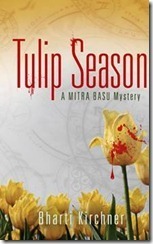 When I first wrote a draft of Tulip Season I believed it fell in the mainstream category (like my four previous novels), but had a mystery element in it. In time, I showed it to my editor at a big New York house. Her response stunned me. She said she liked the main character Mitra, her relationships, the twists and turns, and the Bollywood aspect of the story, but added, “Take the mystery out.”
When I first wrote a draft of Tulip Season I believed it fell in the mainstream category (like my four previous novels), but had a mystery element in it. In time, I showed it to my editor at a big New York house. Her response stunned me. She said she liked the main character Mitra, her relationships, the twists and turns, and the Bollywood aspect of the story, but added, “Take the mystery out.”
But the mystery of the disappearance of Mitra’s best friend was at the heart of the story. How could I eliminate that and the severe effect of that disappearance? My expectation has met cold hard reality. I told my editor I’d take some time and think about it. In effect what I did was to put the novel away.
Then my editor left the publishing house, which didn’t make it easy for me. I began to wonder: What should I do with this manuscript? I believed Tulip Season was as a good a book as I’d ever written, possibly better, and that it deserved a home. Every so often I’d take out the manuscript and work on it, aware that it was actually becoming more of a mystery novel. To make a long story short, a friend suggested showing it to a small publisher and after some thought I did. To two of them. Both seemed enthusiastic about the book, the fact that it was an unusual mystery novel, and made offers. I accepted one. Happily for me, Tulip Season: A Mitra Basu Mystery is just out in Kindle and Nook formats, with the paperback to be released next week.
What have I learned? That there are other alternatives to a big publisher. That for each book there is a perfect fit and you have to find it. If you’re struggling to find a home for a manuscript, you might do well to consider all possible venues for publishing, one of which is a small independent press.
Note that small presses come in different colors. There are academic presses (such the University of Michigan Press) which do few trade books, but function more like a legacy publisher. There are small but distinguished literary presses (such as Algonquin). Then there are also e-publishers, who might or might not do print books. Check the history of the press and its reputation before you plunge in. Many websites have “Authors beware” type of information.
What are some other differences? You might get little or no advance money, but can often expect a higher percentage of royalty. Your book may not take as long to hit the market, but you may have to forgo pre-publication reviews (such as in Publisher’s Weekly or Kirkus Reviews). You might work more closely with your press, but may have to assume more responsibilities. If predictions of pundits are correct, small presses will play a big role in the industry in future.
*************************
 Bharti Kirchner is the prolific author of eight books -- four novels and four cookbooks. Her fifth, a mystery novel Tulip Season: A Mitra Basu Mystery is due out in 2012. Her work has been translated into German, Dutch, Spanish, Marathi, Thai and other languages. Her fourth novel Pastries: A Novel of Desserts and Discoveries (St. Martin’s Press) was selected for the Summer Washington Reads program. Darjeeling (St. Martin’s Press), a third novel, received endorsements from top national authors. Shiva Dancing (Dutton), her first novel, was chosen by Seattle Weekly to be among the top 18 books by Seattle authors in the last 25 years. ("A finely crafted novel," says Publisher’s Weekly. "A fresh literary terrain," says San Francisco Chronicle.) Sharmila’s Book, a second novel, was published by Dutton. (“Smart, swift, and funny,” says Publisher’s Weekly.) You can find Bharti Kirchner at her website (http://www.bhartikirchner.com ) or on Twitter at @bhartikirchner.
Bharti Kirchner is the prolific author of eight books -- four novels and four cookbooks. Her fifth, a mystery novel Tulip Season: A Mitra Basu Mystery is due out in 2012. Her work has been translated into German, Dutch, Spanish, Marathi, Thai and other languages. Her fourth novel Pastries: A Novel of Desserts and Discoveries (St. Martin’s Press) was selected for the Summer Washington Reads program. Darjeeling (St. Martin’s Press), a third novel, received endorsements from top national authors. Shiva Dancing (Dutton), her first novel, was chosen by Seattle Weekly to be among the top 18 books by Seattle authors in the last 25 years. ("A finely crafted novel," says Publisher’s Weekly. "A fresh literary terrain," says San Francisco Chronicle.) Sharmila’s Book, a second novel, was published by Dutton. (“Smart, swift, and funny,” says Publisher’s Weekly.) You can find Bharti Kirchner at her website (http://www.bhartikirchner.com ) or on Twitter at @bhartikirchner.
May 1, 2012
When You Get Stuck
by Elizabeth S. Craig, @elizabethscraig
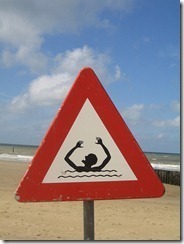 There comes a point in almost every manuscript where I get a little stuck.
There comes a point in almost every manuscript where I get a little stuck.
I’m either bogged down by the story itself or by outside forces (i.e.—life).
It’s not writer’s block. It’s just…stalling. Not wanting to move forward, not sure how to move forward. Hesitating.
And I have absolutely no time for it. I handed in a book yesterday and I have a book due (different series) July 1. Hesitation is not part of my game plan.
The most important thing is to diagnose what’s behind the hesitation (in my case, very quickly) and order up a quick prescription. Or an emergency surgery.
First of all, figure out what is making you stuck:
You aren’t sure how to approach the next scene.
You aren’t in the mood to write the next scene.
You aren’t sure how to move forward with your plot.
You can’t seem to get the writing done during the day.
Your house offers too many other options for things to do.
Things I’ve done to treat this hesitation:
1) Change of Location. I’ve:
Written at the library.
Written at a diner way out in the country that had no Wi-Fi (and left my phone in the car.)
Written at the coffeehouse.
Taken my children and a large group of their favorite friends to the bowling alley/the skating rink/the swimming pool. I’ve put dollar bills on the table for everyone’s drinks and snacks and written until they all wanted to leave or were all arguing with each other. :)
2) Change of Story Direction (moving forward…not fixing what I’d written before that point.) I’ve:
Merged two characters into one character.
Added a character.
Killed a character.
Inserted an argument.
Turned one character’s wife into his best friend’s wife.
Changed the method of the murder.
Changed the murderer.
Listed 20 or more ways to approach the next scene. Listed 20 ways to end the story. Listed 20 ways for something unexpected to happen.
3.) Change of process. I’ve:
Skipped the rest of the chapter I was stuck on and kept going.
Written the ending of the book first.
Written the ending and then worked backward from that point.
Written the rest of the book out of order on different Word docs (and, no, I don’t recommend this!)
Written the scene I was in the mood to write (the funny scene, the scary scene, the scene when it all starts making sense to the sleuth.)
4.) Change of schedule. I’ve:
Written before going to bed.
Written when the children came home from school while they were doing their homework.
Gotten up in the middle of the night to write.
Written 1/2 a page at 4 different points during the day.
Set a timer and written for 20 minutes, done housework for 20 minutes, written for 20 minutes, paid bills and organized my desk for 20 minutes, written for 20 minutes, exercised for 20 minutes…
I think we all get stuck sometimes. But we can brainstorm ways to get through it. Maybe it’s better if we expect to be stuck, then we can have a plan in place already.
Do you get stuck sometimes? How do you work through it?
Image—Flickr—IndiepoprockJesse
April 29, 2012
Why One Traditionally-Published Author is Now Choosing Self-Publishing—by Jessica Park
by Jessica Park, @JessicaPark24
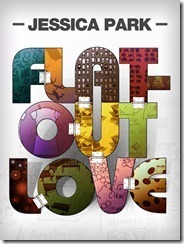 I am an unapologetic fan of self-publishing. Massive, foam finger-waving fan. But, for the record, I realize that it’s not for everyone. Big publishers have obvious distribution and marketing power that authors don’t have. They edit your books, provide covers, and more. Well, sometimes more.
I am an unapologetic fan of self-publishing. Massive, foam finger-waving fan. But, for the record, I realize that it’s not for everyone. Big publishers have obvious distribution and marketing power that authors don’t have. They edit your books, provide covers, and more. Well, sometimes more.
But there are huge downsides: advances are minimal these days, royalty rates are crummy, and we wait a year or more after a book as been accepted to see that book go up for sale.
The money, let’s face it, is often completely crummy. Terrible. Pitifully small amounts dolled out over time and delivered alongside truly incomprehensible royalty statements.
Did I try to sell FLAT-OUT LOVE to a publisher? Yep. For me, there was still something to be said for having a big publishing house stand behind your work, so I thought it was worth seeing what kind of offers I could get. I wanted that New York validation. I wanted to hear, “We want you.”
My agent loved this book and was confident that she could sell it. Editors loved this book, too. But what I heard over and over from publishers were two things: 1. The heroine is eighteen years old and categorically too old for a young adult book, and 2. (I’m not making this up.) There are no vampires. “Realistic fiction” has taken a dive in the market and nobody cares about real people.
Okay, I’m paraphrasing that second one, but that’s the gist of it. Look, I enjoy a good vampire story, too, but that doesn’t mean that… Oh, whatever. Then I had editors from adult divisions saying that, while there was so much to love about the book, and it really “resonated” with them, the heroine is too young for mainstream fiction, and they didn’t know what they could possibly do with my little book. (I had a few ideas about what they could do with the book, but I’ll keep those to myself.)
This all seemed silly to me. Am I the only person to have written a book about a college freshman? It’s such a pivotal time in life. Why is this age so shunned in the publishing industry? Flat-Out Love is a unique story, but very often publishers don’t want unique. They don’t want to take on what they consider to be a “risk.” They want as close to a “guaranteed” bestseller as possible.
So I was annoyed. And really angry. I hate, absolutely HATE having to tout my own book, but the truth was that I knew I had written a very strong book, and I knew that it deserved to be published. The feedback I got from publishers about my book confirmed for me how totally out of touch they were with readers because I knew, absolutely knew, that there would be an audience for my story.
Before I had heard back from more publishers (a girl can only take “I’m head-over-heels for this book but we won’t buy it” so many times), I decided to self-publish. The rejections I’d amassed from pubs were, in almost every way, an enormous relief. I’d felt an obligation, almost, to try for a big New York deal. That was dumb. It was solely an ego thing. I realized that I’d been dreading getting into a relationship with a publisher, and I cared about this book too much to give it away for a next-to-nothing advance and then be forced to wait however long to get it on shelves, where it would then likely be hideously overpriced. I love my agent, and it was a little tough to tell her what I was doing, but I knew that I had to make a business decision. As much as I love her, I couldn’t leave the book with her just because she’s such an awesome person. That would’ve been crazy.
Self-publishing gives you massive control over your own work, which I find incredibly appealing. I get to choose my price and cover, and I can make changes to those and to the text at any point. I’m in charge of everything. I get paid monthly, whereas large publishers pay you (theoretically) every six months, and only after you’ve earned out your advance.
The book has been out for a year now, and I’ve sold over 75,000 copies. I have made more money on this book than I made writing five books for a large publishing house. A lot more. I obviously can’t guarantee these numbers for every self-published book, but even if you sell a fraction of this, you can still earn good money.
I’ve put up one other full-length novel, RELATIVELY FAMOUS, and three e-shorts, and I have zero regrets. Like anything, self-publishing is a learning process, but once you get the hang of it, it’s plenty of fun.
The three most important things to focus on if you go this route are: 1. Get a strong cover. If your book isn’t selling, change it. And then change it again if you want. 2) Price your book smartly. I wouldn’t do anything over $3.99—maybe, maybe $4.99--for an ebook. 3) Pay for a good editor. Or more than one good editor. Don’t put up a totally sloppy book. Even professionally copyedited books have errors, and we’ve all read books published by a huge house that have mistakes. It happens. But you run a much greater risk of errors trying to proofread your own work. I cannot tell you how many times I have read my own book and missed blatant mistakes. You need to get as many people as possible to read you work, including non-professionals (who are great at catching missing words!), because it’s impossible to see typos and such in your own work. I’m sure I still have some. But it’s not a frightful mess.
You’ll be doing your own marketing. Frankly, you’d be doing this anyway (unless, that is, you’re already such a huge success that you can just sit back and watch your sales numbers skyrocket). Bloggers are the powerhouse of reviews these days. I thought that writers were a generous bunch, but even that incredible group is getting a run for their money because book bloggers routinely offer to do whatever they can to promote your book. It’s really amazing. As the population as a whole is learning so much about the book industry (note: See six million articles about Amanda Hocking and Barry Eisler), bloggers and readers are becoming much more open to reviewing and buying self-published ebooks. More often than not, if you ask, bloggers will help and readers will buy.
The market for self-published books is growing, and more and more readers are finding that self-published books are not junk books that were haphazardly uploaded because they weren’t good enough to be traditionally published. Talented, skilled authors are choosing this route and intentionally bypassing the exhausting, often miserable, experience of working for a publisher.
Do I have plans to seek out a New York publisher again? No. Of course, after everything I’ve posted online about them, I can’t imagine that they’d want me anyway. That’s fine. I like working for myself. I have no deadlines, no one to answer to, no nodding and smiling at tragic covers, no wincing when my ebook is priced at $9.99…. None of that.
I am free, I am empowered.
There are some truly wonderful, talented, supportive people who work in publishing. Some authors have great experiences with houses. I can’t, offhand, think of any (Kidding! Kidding! Sort of….) but I’m sure there are some. What I unfortunately hear most often are the ways in which authors are struggling with their publishers, and I have friends who have nearly stopped writing because of what they’ve suffered at the hands of publishers. This is not an exaggeration; it is a painful reality for many authors.
When you sell your book to a publisher, that book is gone. These days, you are unlikely to ever get the rights back, and you will have no control over what they do with it. You may be okay with that, and you may prefer to have someone else in charge of your book. Now that I know what self-publishing can do for me, I’m not vaguely okay with that. I’m happy… ecstatic, actually… to be in such creative control of my work.
I’m writing another novel now, and I realized the other day that had I been contracted for a few books through a publisher, I could not write the story that I’m working on now. This book has stronger language and sexual content that puts it into a different category from Flat-Out Love. I know my readers, I know my audience, I know my market. I know what’s selling. I have a story that I want to tell, and I do not want to be controlled by the constraints of a publisher who in all likelihood would never allow me to stray this far from Flat-Out Love. I’m also working with a small app group and we are building an incredibly innovative enhanced edition of the book that will be loaded with multimedia and interactive and immersive elements. I also couldn’t have done that if I’d been contracted to a publisher.It’s my book, it’s all mine. And I love that.
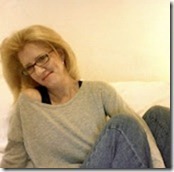 Jessica Park is the author of the young adult novel RELATIVELY FAMOUS, five Gourmet Girl mysteries (written as Jessica Conant-Park) , FLAT-OUT LOVE, and the e-shorts FACEBOOKING RICK SPRINGFIELD and WHAT THE KID SAYS (Parts 1 & 2).
Jessica Park is the author of the young adult novel RELATIVELY FAMOUS, five Gourmet Girl mysteries (written as Jessica Conant-Park) , FLAT-OUT LOVE, and the e-shorts FACEBOOKING RICK SPRINGFIELD and WHAT THE KID SAYS (Parts 1 & 2).



